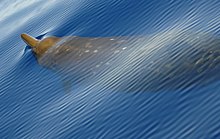Teutophagy

Teutophagy or Teuthophagy describes the exclusive or predominant diet by cephalopods in various marine life. The teutophagous creatures include various whales such as the beaked whale and the round head dolphin, as well as some sharks and other fish . Substantial shares can also be found in Robben , v. a. for elephant seals they can be the main food at least regionally. Teutophage animals are often characterized by a relatively wide mouth and a reduction in teeth. This is particularly evident in the beaked whales, which usually only have two teeth in the lower jaw . Teutophage toothed whales often suckle their prey instead of grasping it with their teeth.
The term is derived from the scientific name "Teuthida" of the squids , which are the most common group of pelagic cephalopods. In the international scientific literature both the spellings with and without h in " teutho- " ( teutophagous ) are used. " Teuto- " has established itself in German-language literature .
Proof of diet is not always easy. Since squids have hardly any hard parts and are digested quickly, the only evaluable residue is usually the beak, and occasionally the lenses of the eyes.
swell
- Alexander J. Werth (2007): Adaptations of the cetacean hyolingual apparatus for aquatic feeding and thermoregulation. The Anatomical Record : Advances in Integrative Anatomy and Evolutionary Biology (Special Issue: Anatomical Adaptations of Aquatic Mammals). Volume 290, Issue 6: 546-568. doi : 10.1002 / ar.20538 .
- MB Santos, MR Clarke, MJ Pierce (2001): Assessing the importance of cephalopods in the diets of marine mammals and other top predators: problems and solutions. Fisheries Research 52: 121-139.